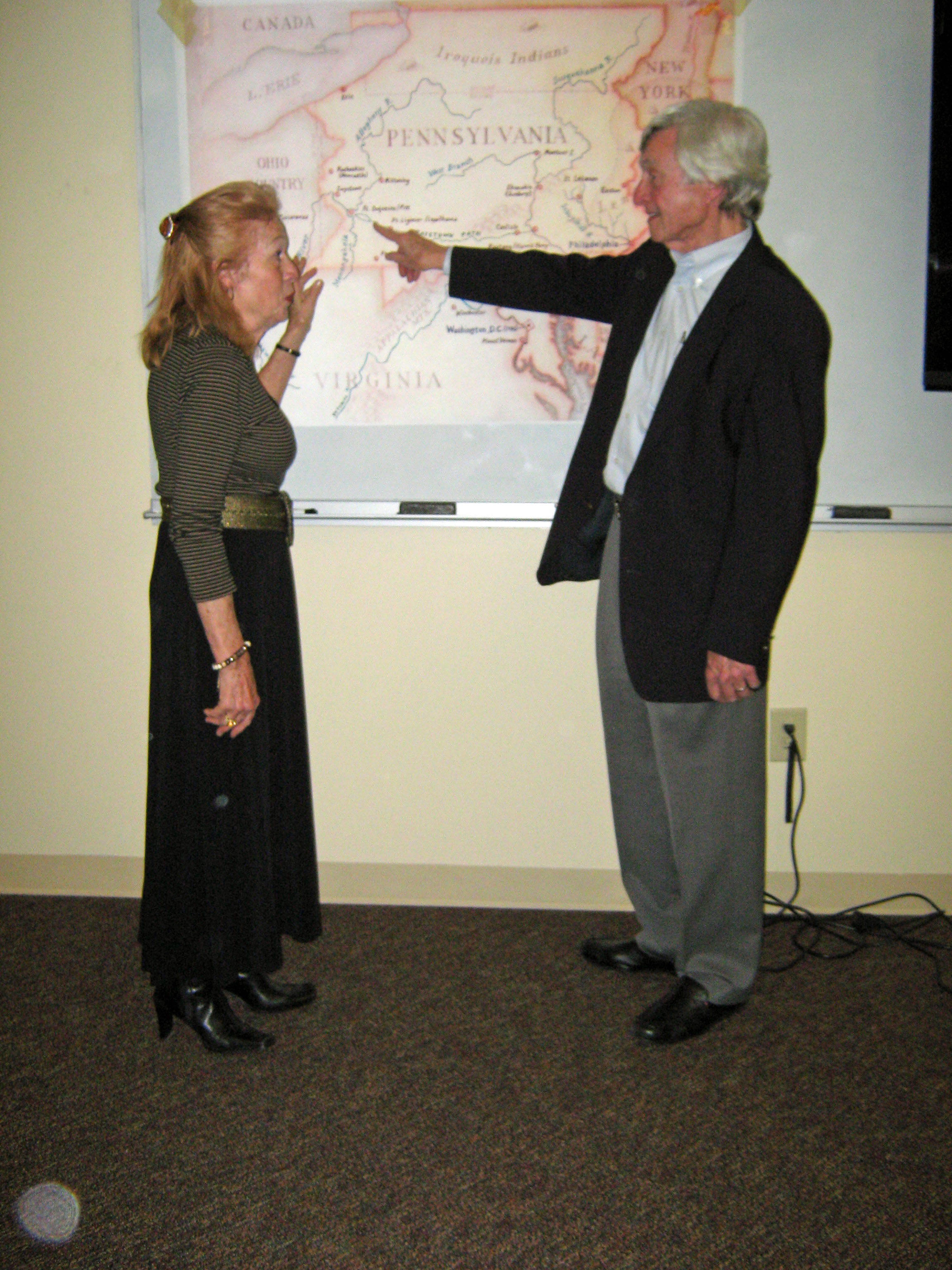News And Events
May 4 Member Meeting
News
 The program chairman, Carolyn Mitchell, introduced the speaker, Dr. Elizabeth Dowling (both pictured left), who is an architectural historian and has several books on the subject to her credit. She taught architecture at Georgia Tech for 37 years, Dr. Dowling gave a slide presentation depicting the very beginning of classic Greek and Roman architecture and how it influenced architecture through the centuries, Classical architecture began to decline in England when it became too expensive to design and build structures, especially after the world wars. Fortunately, during the late 80's a resurgence of interest in the preservation of classical design began to immerge in the U.S. and England by architects like Jon Simpson, Quinlan Terry, Craig Hamilton and even a local Atlanta architect, Norman Askins. Universities began to offer classes on classic design. Prince Charles was instrumental in expressing the need to bring back classicism as opposed to the ultra-modern offerings that have been erected in London in recent years. Dr. Dowling showed us some buildings in London that were built recently in the classic style. The same is going in the United States.
The program chairman, Carolyn Mitchell, introduced the speaker, Dr. Elizabeth Dowling (both pictured left), who is an architectural historian and has several books on the subject to her credit. She taught architecture at Georgia Tech for 37 years, Dr. Dowling gave a slide presentation depicting the very beginning of classic Greek and Roman architecture and how it influenced architecture through the centuries, Classical architecture began to decline in England when it became too expensive to design and build structures, especially after the world wars. Fortunately, during the late 80's a resurgence of interest in the preservation of classical design began to immerge in the U.S. and England by architects like Jon Simpson, Quinlan Terry, Craig Hamilton and even a local Atlanta architect, Norman Askins. Universities began to offer classes on classic design. Prince Charles was instrumental in expressing the need to bring back classicism as opposed to the ultra-modern offerings that have been erected in London in recent years. Dr. Dowling showed us some buildings in London that were built recently in the classic style. The same is going in the United States.
Read Full Story
2017 Annual General Meeting
News
The Annual General Meeting that was called to order by Wesley Devoto, OBE, Chairman of the Board. First order of business was the presentation of the slate of officers and board members by the Chairman of the Nominating Committee, Grace Sanders, to be voted on by the membership. The Nominating Committee had worked hard to put together an excellent roster of candidates. A vote was called for to approve the nominees, and they were approved unanimously. A listing of the new Board can be found on the "About Us" page of this website.
Some committee chairpersons gave reports on the activities of the past year, and the President, Don Pattillo, talked about the achievements and changes that had gone on during the last 12 months in addition to his vision for the future of our branch. The Treasurer, Charles Maddrey, gave us his report on the finances of our branch which is in very good condition. Thanks to the generosity of our members, we were able to give a $5,000 scholarship plus airfare to our current TLAB recipient who will attend Oxford over this summer.
Read Full Story
February 23 Member Meeting
News
 Thomas McElhinny was featured as the ESU speaker at the February 23, 2017 Member meeting. His presentation was on the history of the French and Indian War in America which was ignited by the actions of a very young George Washington. The confrontation subsequently became a worldwide conflict known in history as the Seven Years War, which Winston Churchill described as "the first world war". England's defeat of the French brought an end to the French Empire in North America. This defeat gave England a clear path to controlling the new world and destroyed the ability of native peoples to resist the expansion of Anglo-American settlements in North America.
Thomas McElhinny was featured as the ESU speaker at the February 23, 2017 Member meeting. His presentation was on the history of the French and Indian War in America which was ignited by the actions of a very young George Washington. The confrontation subsequently became a worldwide conflict known in history as the Seven Years War, which Winston Churchill described as "the first world war". England's defeat of the French brought an end to the French Empire in North America. This defeat gave England a clear path to controlling the new world and destroyed the ability of native peoples to resist the expansion of Anglo-American settlements in North America.

Read Full Story
2017 BRANCH SHAKESPEARE COMPETITON
News
 On February 19th the Branch held its annual National Shakespeare Competition at the New Shakespeare Playhouse. Branch Competition Chair Pam Sellman orchestred the 18 local high school contestants through their paces as each presented a sonnet and a 20 line monologue from a play of their choice. Each of the contestants was the winner of their school competition.
On February 19th the Branch held its annual National Shakespeare Competition at the New Shakespeare Playhouse. Branch Competition Chair Pam Sellman orchestred the 18 local high school contestants through their paces as each presented a sonnet and a 20 line monologue from a play of their choice. Each of the contestants was the winner of their school competition.
Marilyn Moore was selected the winner by the there (3) professional actors/drama educators who served as the competition panel. She won an expense-paid trip to New York City where she will compete in the National Competition that includes the winners from 50 other Branches.
Read Full Story
January 29 Meeting
News
 The turnout for our January meeting was excellent with many guests in attendances. "How Brexit Baffled Britain" was the provocative subject that our speaker, Patrick Allitt, spoke about at our first meeting of the year. He definitely kept our attention as he gave the historical background that had led to the creation of the Common Market/European Union. With two horrific World Wars devastating most of Europe financially and otherwise, something needed to change in the way European countries interacted with each other to prevent future conflicts. Trade was thought to be a way to ease tensions, and a mutually beneficial trade effort was initiated in 1951 with 6 countries called European Coal & Steel Commission. As with so many ideas that start out with good intentions, over the years the EU became a huge bureaucracy that decided it would be a good idea to have their own military, its own currency and overwhelming rules and regulations so that everyone would be on the same page. One important aspect of the EU is the free flow of people between the countries. The individual nations who elected to join the EU had the option of using the Euro for buying and selling to the majority of the countries have. However, the overreaching rules and regulations that standardized everything from cheese to dog leaches ended up destroying much of the uniqueness and sovereignty of each country.
The turnout for our January meeting was excellent with many guests in attendances. "How Brexit Baffled Britain" was the provocative subject that our speaker, Patrick Allitt, spoke about at our first meeting of the year. He definitely kept our attention as he gave the historical background that had led to the creation of the Common Market/European Union. With two horrific World Wars devastating most of Europe financially and otherwise, something needed to change in the way European countries interacted with each other to prevent future conflicts. Trade was thought to be a way to ease tensions, and a mutually beneficial trade effort was initiated in 1951 with 6 countries called European Coal & Steel Commission. As with so many ideas that start out with good intentions, over the years the EU became a huge bureaucracy that decided it would be a good idea to have their own military, its own currency and overwhelming rules and regulations so that everyone would be on the same page. One important aspect of the EU is the free flow of people between the countries. The individual nations who elected to join the EU had the option of using the Euro for buying and selling to the majority of the countries have. However, the overreaching rules and regulations that standardized everything from cheese to dog leaches ended up destroying much of the uniqueness and sovereignty of each country.
Read Full Story
 The program chairman, Carolyn Mitchell, introduced the speaker, Dr. Elizabeth Dowling (both pictured left), who is an architectural historian and has several books on the subject to her credit. She taught architecture at Georgia Tech for 37 years, Dr. Dowling gave a slide presentation depicting the very beginning of classic Greek and Roman architecture and how it influenced architecture through the centuries, Classical architecture began to decline in England when it became too expensive to design and build structures, especially after the world wars. Fortunately, during the late 80's a resurgence of interest in the preservation of classical design began to immerge in the U.S. and England by architects like Jon Simpson, Quinlan Terry, Craig Hamilton and even a local Atlanta architect, Norman Askins. Universities began to offer classes on classic design. Prince Charles was instrumental in expressing the need to bring back classicism as opposed to the ultra-modern offerings that have been erected in London in recent years. Dr. Dowling showed us some buildings in London that were built recently in the classic style. The same is going in the United States.
The program chairman, Carolyn Mitchell, introduced the speaker, Dr. Elizabeth Dowling (both pictured left), who is an architectural historian and has several books on the subject to her credit. She taught architecture at Georgia Tech for 37 years, Dr. Dowling gave a slide presentation depicting the very beginning of classic Greek and Roman architecture and how it influenced architecture through the centuries, Classical architecture began to decline in England when it became too expensive to design and build structures, especially after the world wars. Fortunately, during the late 80's a resurgence of interest in the preservation of classical design began to immerge in the U.S. and England by architects like Jon Simpson, Quinlan Terry, Craig Hamilton and even a local Atlanta architect, Norman Askins. Universities began to offer classes on classic design. Prince Charles was instrumental in expressing the need to bring back classicism as opposed to the ultra-modern offerings that have been erected in London in recent years. Dr. Dowling showed us some buildings in London that were built recently in the classic style. The same is going in the United States.

 Facebook
Facebook YouTube
YouTube LinkedIn
LinkedIn Email
Email Twitter
Twitter Email Sign-Up
Email Sign-Up Share
Share Print
Print Thomas McElhinny was featured as the ESU speaker at the February 23, 2017 Member meeting. His presentation was on the history of the French and Indian War in America which was ignited by the actions of a very young George Washington. The confrontation subsequently became a worldwide conflict known in history as the Seven Years War, which Winston Churchill described as "the first world war". England's defeat of the French brought an end to the French Empire in North America. This defeat gave England a clear path to controlling the new world and destroyed the ability of native peoples to resist the expansion of Anglo-American settlements in North America.
Thomas McElhinny was featured as the ESU speaker at the February 23, 2017 Member meeting. His presentation was on the history of the French and Indian War in America which was ignited by the actions of a very young George Washington. The confrontation subsequently became a worldwide conflict known in history as the Seven Years War, which Winston Churchill described as "the first world war". England's defeat of the French brought an end to the French Empire in North America. This defeat gave England a clear path to controlling the new world and destroyed the ability of native peoples to resist the expansion of Anglo-American settlements in North America.
 On February 19th the Branch held its annual National Shakespeare Competition at the New Shakespeare Playhouse. Branch Competition Chair Pam Sellman orchestred the 18 local high school contestants through their paces as each presented a sonnet and a 20 line monologue from a play of their choice. Each of the contestants was the winner of their school competition.
On February 19th the Branch held its annual National Shakespeare Competition at the New Shakespeare Playhouse. Branch Competition Chair Pam Sellman orchestred the 18 local high school contestants through their paces as each presented a sonnet and a 20 line monologue from a play of their choice. Each of the contestants was the winner of their school competition. The turnout for our January meeting was excellent with many guests in attendances. "How Brexit Baffled Britain" was the provocative subject that our speaker, Patrick Allitt, spoke about at our first meeting of the year. He definitely kept our attention as he gave the historical background that had led to the creation of the Common Market/European Union. With two horrific World Wars devastating most of Europe financially and otherwise, something needed to change in the way European countries interacted with each other to prevent future conflicts. Trade was thought to be a way to ease tensions, and a mutually beneficial trade effort was initiated
The turnout for our January meeting was excellent with many guests in attendances. "How Brexit Baffled Britain" was the provocative subject that our speaker, Patrick Allitt, spoke about at our first meeting of the year. He definitely kept our attention as he gave the historical background that had led to the creation of the Common Market/European Union. With two horrific World Wars devastating most of Europe financially and otherwise, something needed to change in the way European countries interacted with each other to prevent future conflicts. Trade was thought to be a way to ease tensions, and a mutually beneficial trade effort was initiated 



